Mondoo Release Highlights April 2025
Introduction
April was all about helping you find and fix critical security issues faster. We rolled out a new Mondoo Model Context Protocol (MCP) server to power AI-assisted remediation, expanded vulnerability detection, added remediations to ticketing, and launched centralized and space-wide exception management. Explore everything new this month to secure your infrastructure.

Mondoo Model Context Protocol (MCP) server
With the Mondoo MCP server, you can now use your favorite AI assistant, such as ChatGPT, Anthropic's Claude or GitHub Copilot to access Mondoo security data for real-time answers and faster vulnerability resolution. Imagine asking your favorite LLM to find and fix critical security findings. With Mondoo's MCP, this is now a reality. Watch the video to see it in action Mondoo MCP: Use your favorite AI assistant to communicate with Mondoo
Mondoo MCP Server is available for private preview for Mondoo customers. Please contact your customer success manager if you'd like to try it out.
Critical vulnerabilities can't hide from Mondoo
Last month we unveiled our all-new vulnerability detection engine. Now that we've launched the new codebase, we've kicked things into high gear this month with new vulnerability detection capabilities. Mondoo now includes vulnerability detection for Python, NodeJS, Google COS, and even Kubernetes installations.
Along with these new capabilities we improved the parsing of vendor advisories, added support for AIX efixes, improved support for third-party vulnerability data from systems like SentinelOne, and improved the reliability of software detection on assets. Stay tuned for even more expanded vulnerability detection capabilities coming to the platform soon.
Automatically include remediation guidance in tickets
When creating tickets, Mondoo now automatically provides platform engineers with all the relevant information they need to resolve vulnerabilities and misconfigurations, including detailed asset information and remediation guidance. This means that they have all the data at their fingertips to quickly remediate risks and avoid the frustrating back-and-forth that comes from receiving incomplete information.

Centralized exceptions management
Unlike other platforms that use many different modules - all with their own exception handling - Mondoo unifies security across your entire IT infrastructure and software development life cycle and allows you to configure your exceptions in one central place. This reduces manual configuration work, avoids errors, and avoids the dreaded spreadsheet teams often use to manage exceptions and compliance tasks.
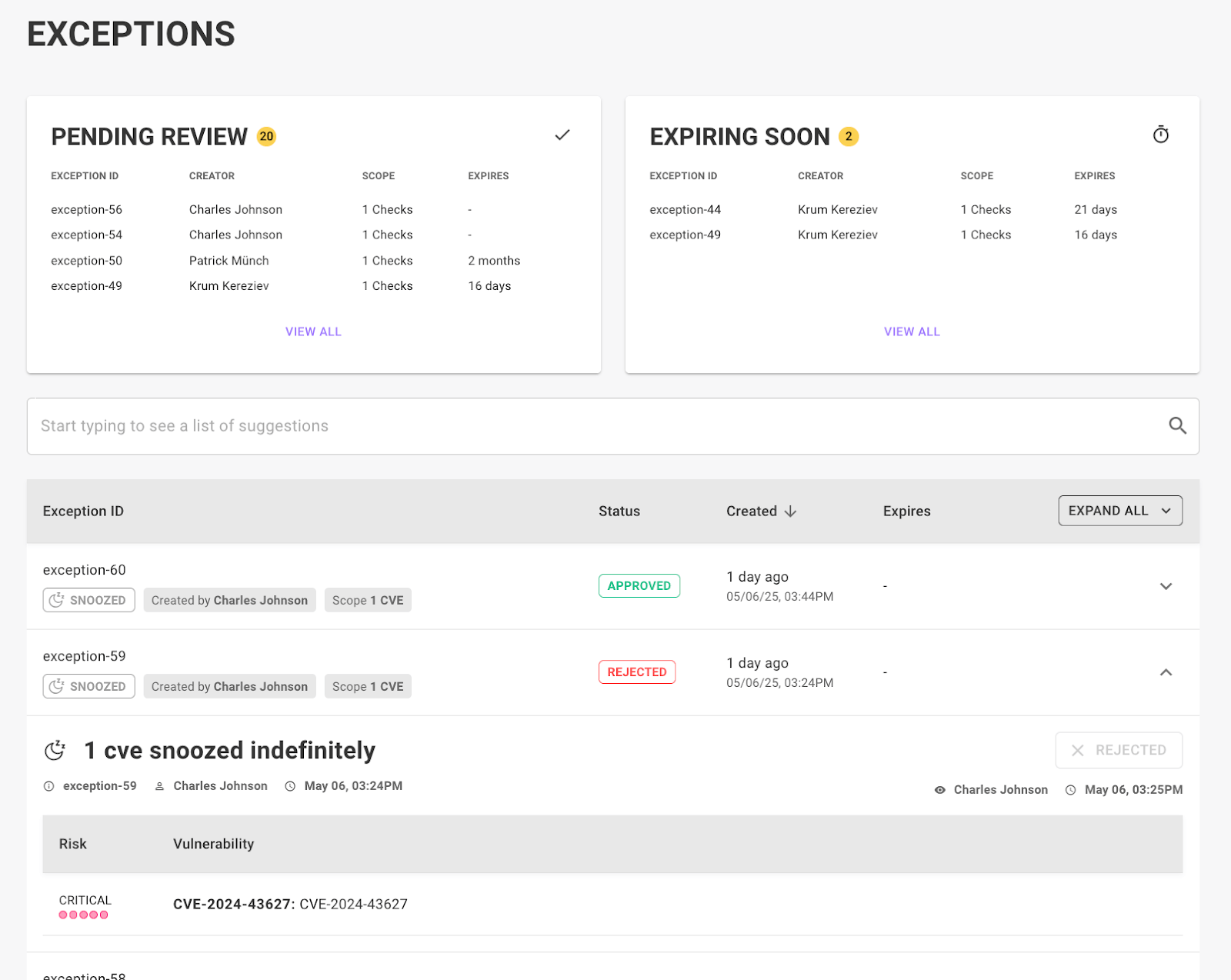
Space-wide exceptions for checks, advisories, and CVEs
With the launch of the new Exceptions page, users can now create space-wide exceptions for security checks, vendor advisories, and CVEs. This makes it easier for teams to prioritize what matters by snoozing or disabling entire classes of findings across a space. It's especially useful for aligning with internal risk tolerances or temporarily deferring non-critical work during high-pressure sprints or audits.
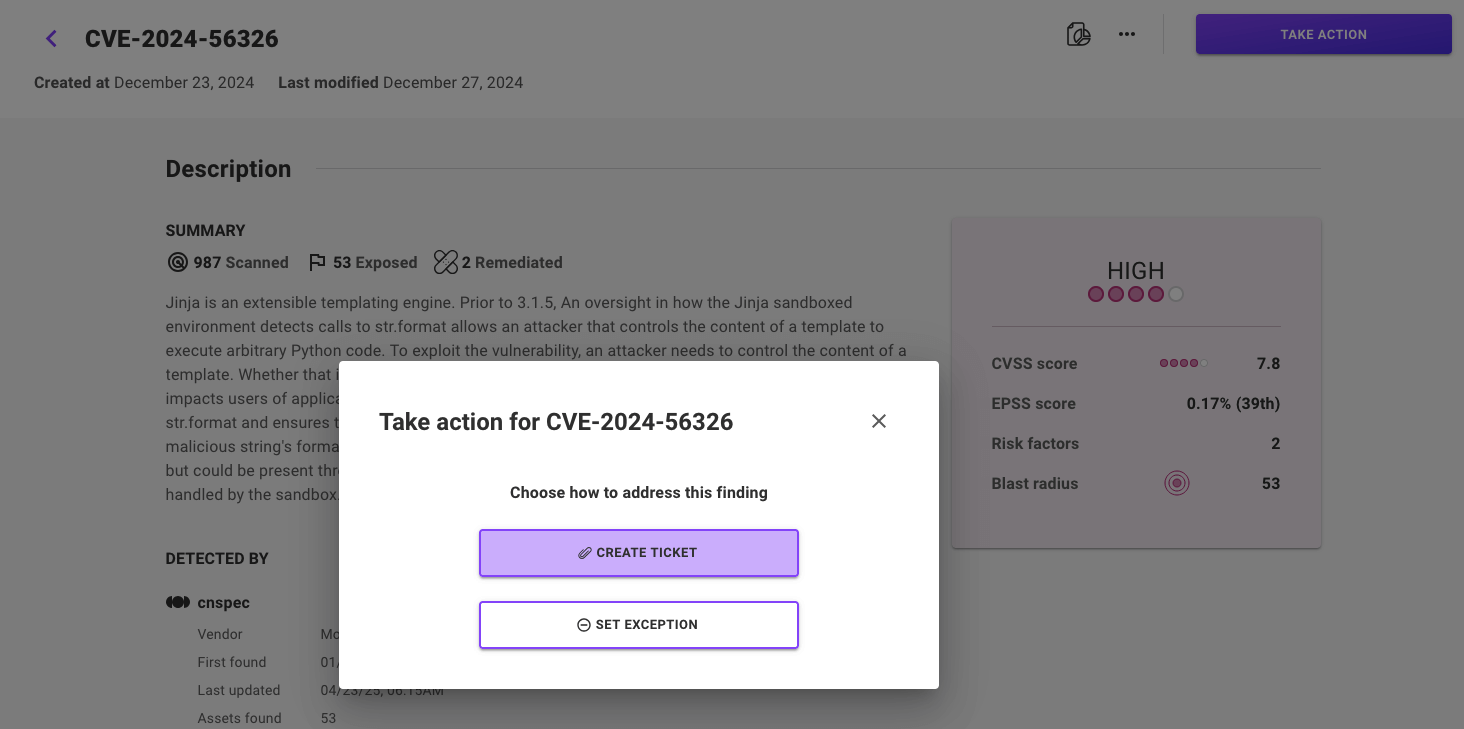
Easily deploy Mondoo at scale using WIF
We've introduced Workload Identity Federation (WIF) support, making Mondoo deployment easier than ever. This removes the need to manage Mondoo credentials at scale. Zero-configuration, zero-trust, fully secure Mondoo clients allowing you to add Mondoo Policy-as-code to 6,000 pipelines in a day.
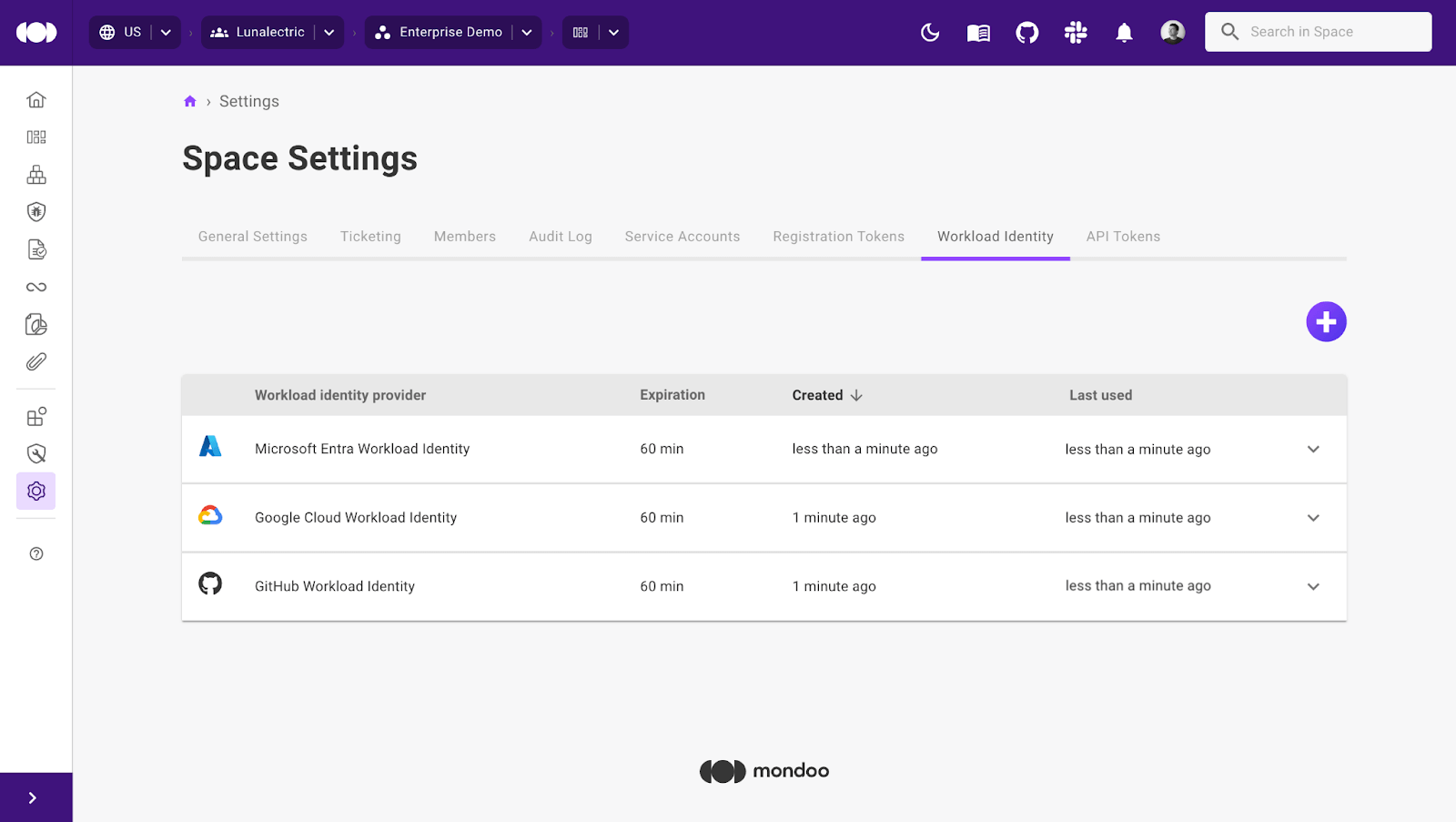
Increased detection of exposed risks
Mondoo's risk factors allow us to raise, or lower, the priority of vulnerabilities or security findings so you can focus on the most important work first. This month we expanded our risk factor capabilities with new cloud internet exposure detections, including:
- Public S3 Buckets
- RDS Instances / Clusters with public endpoints
- Redshift DBs with public endpoints
- GCP Instances with public IPs
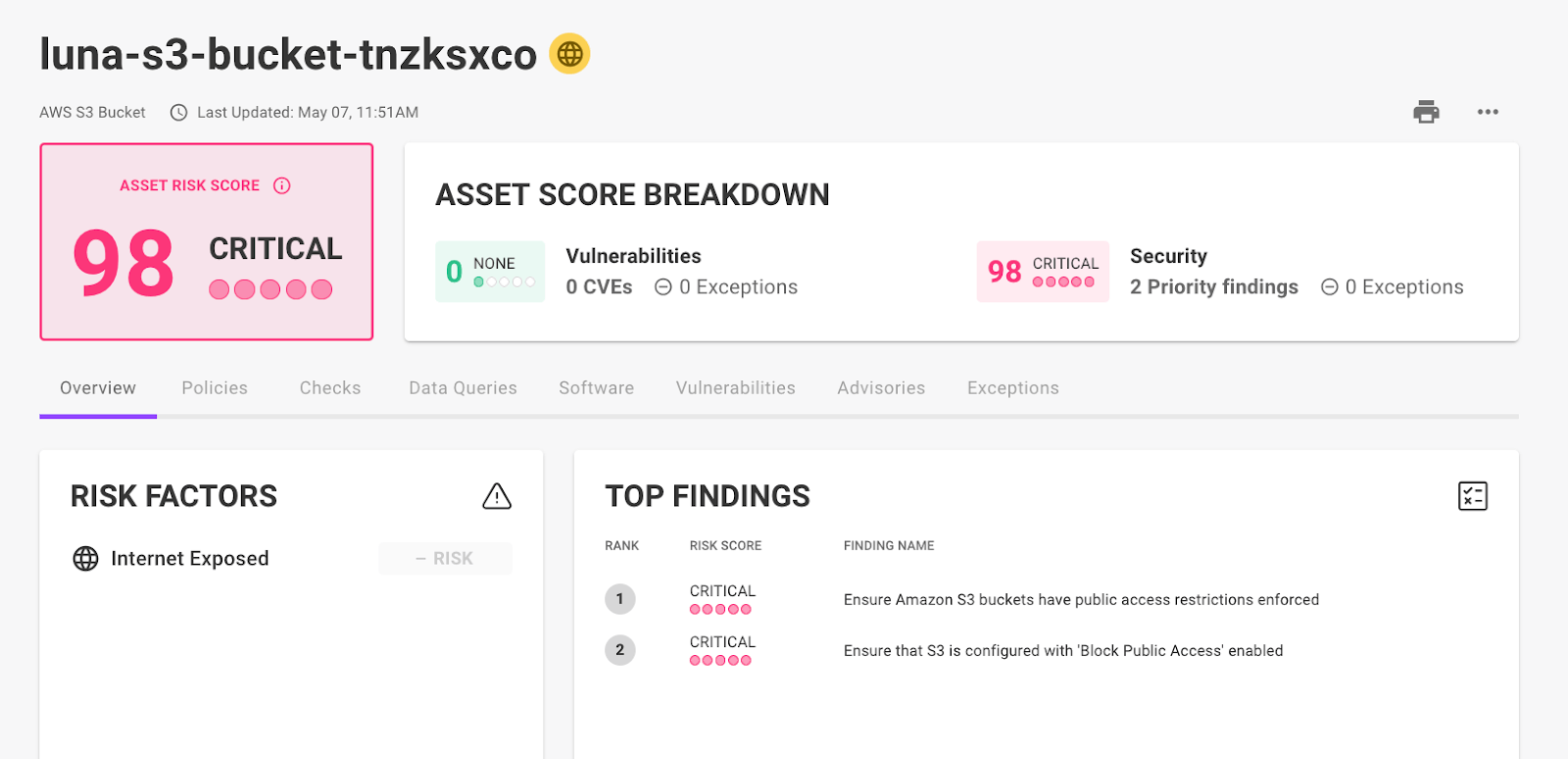
In addition, if a CVE is remotely exploitable, we mark it with the new 'Remotely exploitable vulnerability' risk factor and increase the risk score.
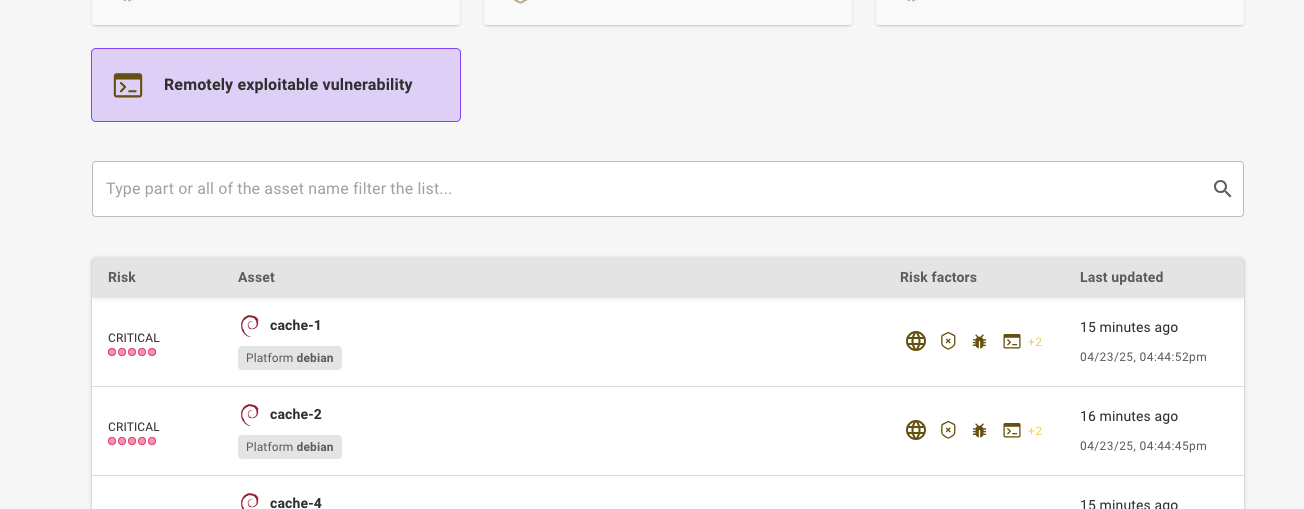
Detailed security findings on assets
Our new asset detail page offers improved insights into security findings, and includes full remediation steps and code snippets for quick resolution. Tickets can be generated directly from the page (which will include all the necessary information for platform engineers), or exceptions can be set to snooze or dismiss the finding.
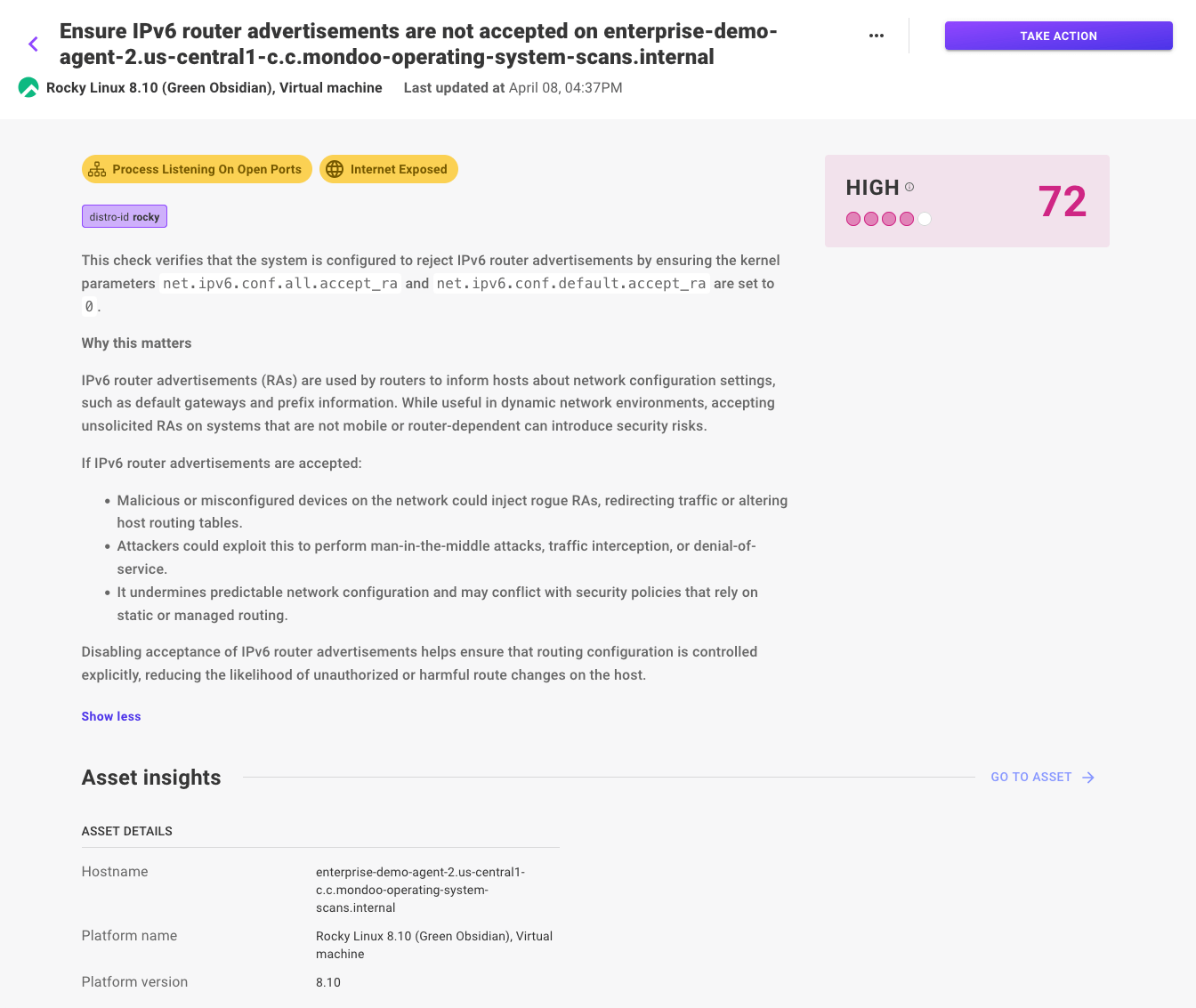
PDF reports for findings
Generate reports on a specific CVE or advisory to find more information about the vulnerability and if there are any exposed assets in your environment. This is useful, for instance, for breaking vulnerabilities or newly exploitable ones.
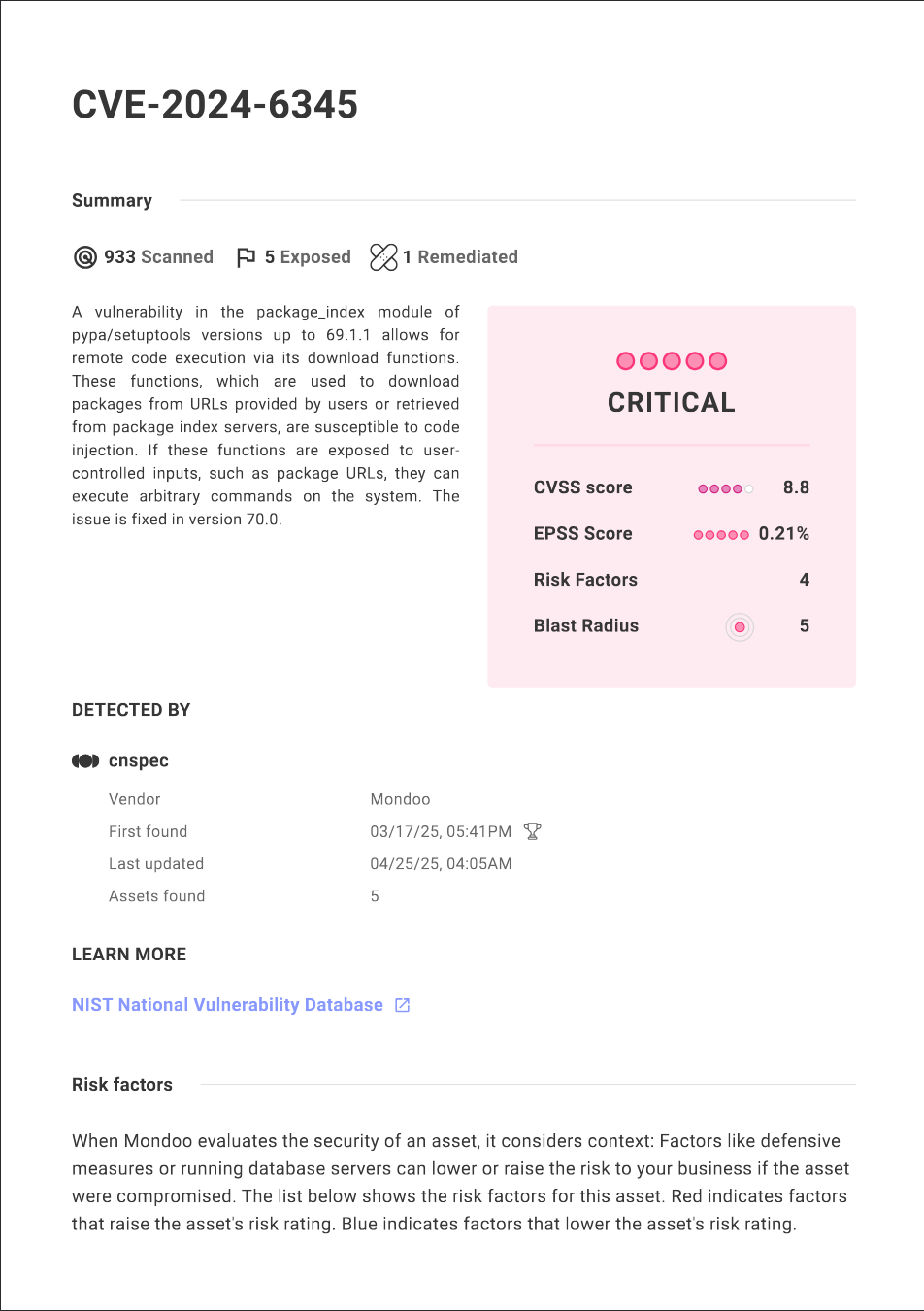
New and updated policies
Policies are at the core of detecting security misconfigurations, and this month we've expanded Mondoo's scanning capabilities with a wave of powerful new and updated policies.
- New CIS AIX 7 benchmark policy - New checks, improved remediation steps, and support for all versions of AIX 7
- New Google Cloud Cost Control Policy - A new policy to avoid unwanted cloud spend by enforcing corporate standards in CI Terraform pipelines
- New Google Cloud Tagging Policy - A new policy to enforce corporate tagging standards on assets before they reach production via CI Terraform scanning.
We've completely rewritten our Mondoo policies for GCP and AWS from the ground up, adding over a dozen new checks focused on your most critical cloud assets. Every existing check has been refined with clearer descriptions and detailed remediation steps across the cloud console, CLI, Terraform, and CloudFormation. To help teams catch misconfigurations early, both policies now include full support for scanning Infrastructure as Code, making it easy to integrate Mondoo directly into your CI pipelines.
Improved creation of spaces using cloud tags and Mondoo annotations
Create workspaces that match the complexity of your cloud tagging structure with a new DOES NOT CONTAIN operator in the workspaces filter setup.
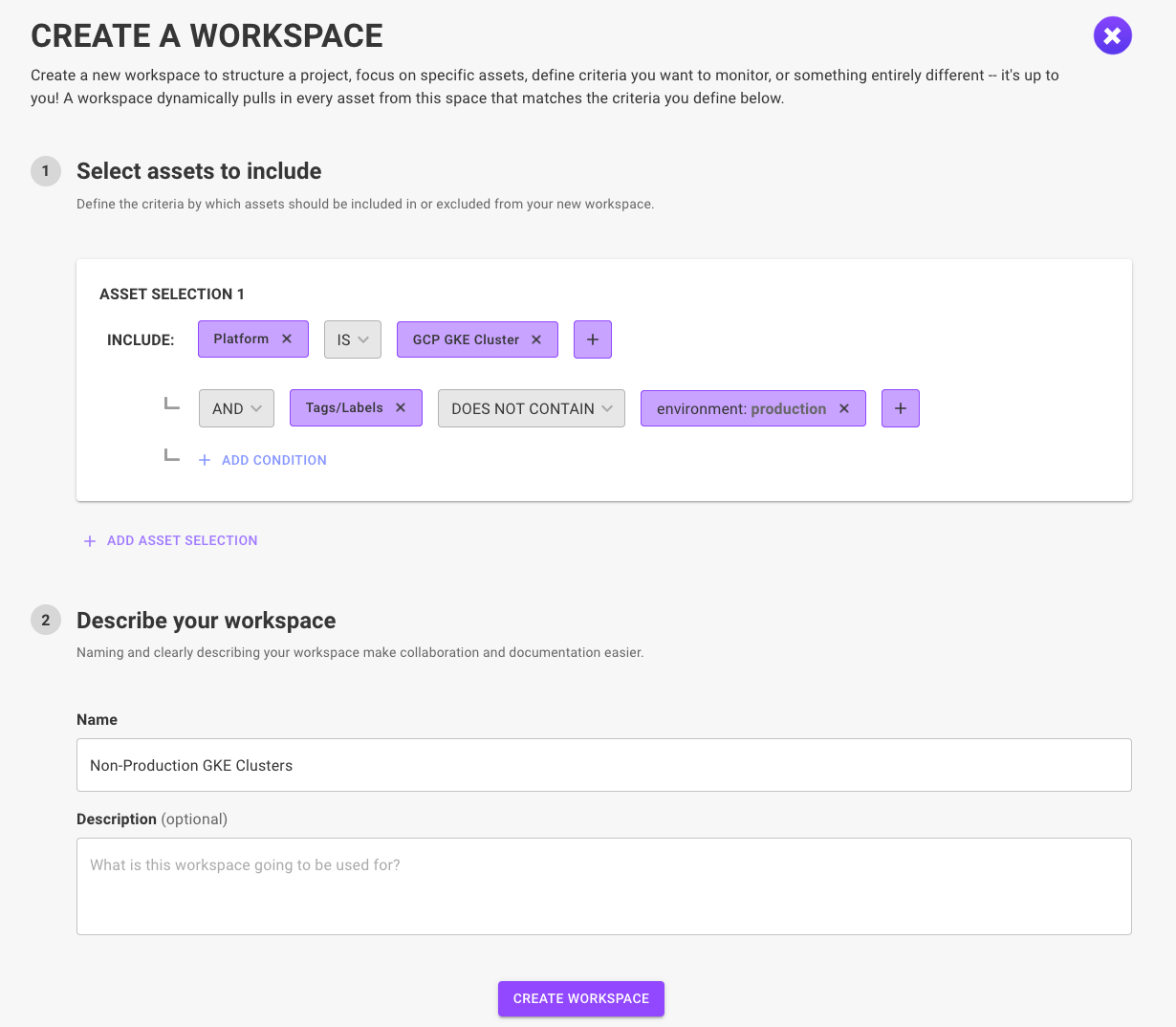
Understand assets at a glance
You can't secure what you don't understand, so this month we further expanded the data Mondoo presents on assets, giving you everything you need to track down exposed assets.
- Release version and installation type (workstation vs. server) for Windows
- IP address information for GCP VMs
- Asset kind information on Linux
- Improved hiding of manufacturer/product data on cloud instances/VMs
- Expanded host information for AIX assets
- Link directly to the service account that performed the scan from the asset overview
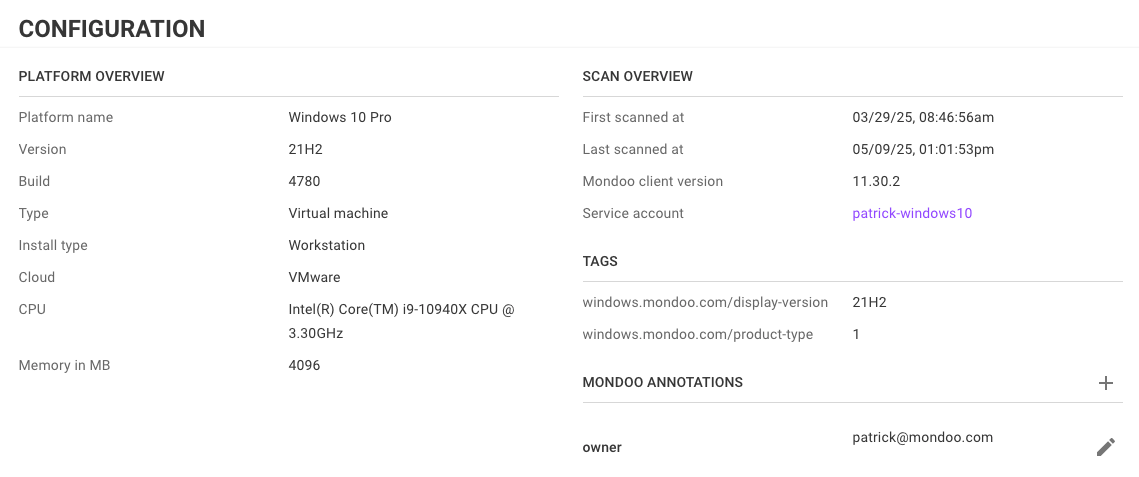
Display how you want and where you want
We're not all hackers working in the dark on 50 inch screens so this month we worked to ensure that Mondoo works great in light mode and on small screens like tablets. We also optimized console load times, removing 1.8MB from the initial load despite all the great new functionality we delivered.
Resource updates
auditd
A new resource for inspecting the auditd configuration on Linux systems.
MQL> auditd.config.params{action_mail_acct: "root"admin_space_left: "50"admin_space_left_action: "suspend"disk_error_action: "suspend"disk_full_action: "suspend"distribute_network: "no"...> auditd.config.params.log_format"enriched"
parse.xml
A new helper for parsing XML so you can use DOM values directly in your policies.
MQL> parse.xml('example.xml').paramsparse.xml.params: {root: {box: [0: {hello: {@a: "1"}}
docker.container
- New
hostConfigfield
k8s.admission.validatingwebhookconfiguration
A new resource for inspecting Kubernetes admission controller validating webhooks.
microsoft.devices
A new resource for inspecting Microsoft Entra devices.
MQLcnquery> microsoft.devicesmicrosoft.devices.list: [0: microsoft.device id="03991a7c-01d0-434b-93c7-af4ba16b39b3" displayName="example"1: microsoft.device id="144189f6-e8eb-479f-ba24-f5c9611cddde" displayName="vmaqs2503131438"2: microsoft.device id="3c89fefb-8459-484a-a746-ff1d30328120" displayName="example2"3: microsoft.device id="523fbf29-5b75-4845-8b1a-936790ea5c2d" displayName="vmaqs2503211816"4: microsoft.device id="70bdc3b9-3d5a-4568-897b-1d7f085926c3" displayName="vmaqs2503191431"5: microsoft.device id="8840eec9-83ab-470a-a7d1-bb92182843c9" displayName="example3"7: microsoft.device id="bd76803a-6d40-45db-aa4c-ac96fef84a13" displayName="example4"]
usb.devices
A new resource for inspecting all USB devices on macOS.
MQLcnquery> usb.devices { * }usb.devices: [0: {serial: "123456"name: "Magic Keyboard with Touch ID"class: "0x00"className: "Use class information in the Interface Descriptors"isRemovable: trueversion: "4.2"speed: "1.5 Mbps (Low Speed)"subclass: "0x00"protocol: "0x00"manufacturer: "Apple Inc."vendorId: "0x05ac"productId: "0x029a"}...]
network.interfaces
A new resource for inspecting network interfaces and IP addresses on Linux, macOS, and Windows.
MQLcnquery> network.interfaces.where(name == 'en0'){ * }network.interfaces.where: [0: {mtu: 1500ips: [0: ipAddress ip=fe80::18d7:e5b7:4b6f:ccc91: ipAddress ip=172.16.1.1902: ipAddress ip=fd17:11c:9eaa:6e48:1c82:3cb1:5d9c:1d80]vendor: ""virtual: nullname: "en0"flags: [0: "UP"1: "BROADCAST"2: "SMART"3: "RUNNING"4: "SIMPLEX"5: "MULTICAST"]active: truemac: "4e:19:13:db:79:c5"}]
Other notable mentions
Sometimes there just isn't time for a deep dive into everything new, but here are some additional changes you might find interesting:
- Support the SLES SAP variant Linux distribution as
sles-sap. - Show friendly platform names in all tables.
- Show the score scale in all risk tool tips so it's easier to understand where an asset stands.
- Move asset deletion behind the triple dot menu on assets to prevent accidental deletion.
- Allow copying host name and finding titles with a single click of the title.
- Add additional audit logging to spaces and organizations and provide more context for each logging event.
- Rework the organization and space member management pages to make it easier to manage users.
- Update pagination to 50 items by default instead of 10.
- Added a --kubelogin boolean flag to the Kubernetes provider which gives the option to authenticate against a remote AKS cluster using a JWT bearer token.
- Initial support for CVSS v4 vulnerability results.